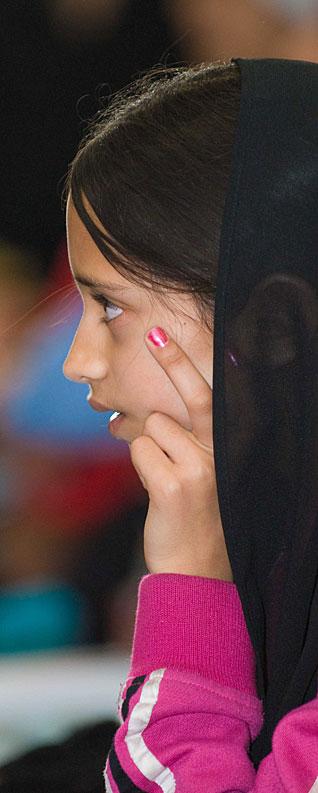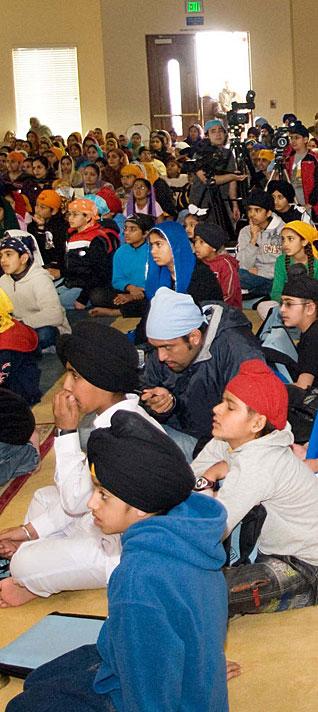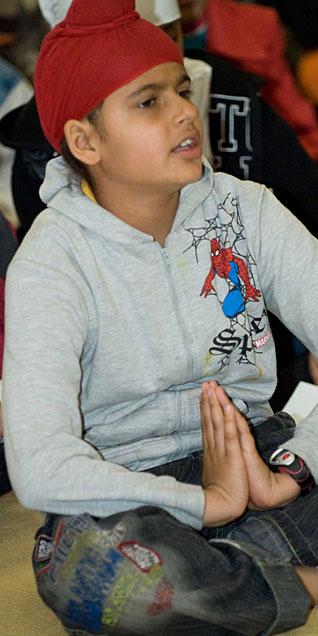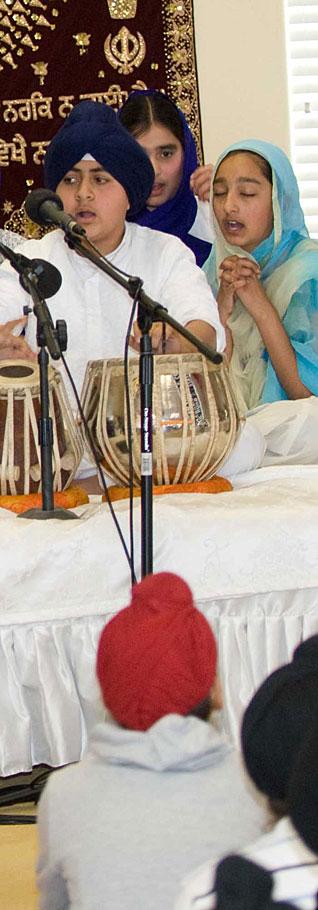Columnists
Reaching Out
by JESSI KAUR
It comes at you in sly touches during unexpected moments - the self-doubt that plagues a lot of parents.
For me, it is almost always tied into whether I have been able to pass on the love of Sikhi to my son, now nineteen.
Listening to Asa-di-Vaar on a Sunday morning, when I am completely drenched in the pathos and poignancy of music mingled with the Guru's wisdom, I often wonder, "Will Anhad ever feel what I feel while listening to Gurbani? Will it ever bring him to tears? Does he truly grasp the meaning and the wisdom embedded in each precious verse?"
As I ask myself these questions, I shy away from the answer that dredges up a certainty in my mind.
I know that the languages of Gurbani are "foreign" to him. Even though I take solace in the fact that he routinely recites or listens to various baanies, I wonder if, one day, a certain verse will pierce his heart wide open, cultivate in him a feeling of empathy and transform the way he looks at the world.
I am filled with a sense of loss, as I realize that there are many young Sikhs in the diaspora for whom delving into a shabad and disappearing in it, losing the sense of time and space and experiencing an inner expansion, is unlikely simply because they are not close to the nuances and subtleties of the languages of our scripture.
Growing up in India, we absorbed not only English, but Punjabi, Hindi, Urdu and/or even Sanskrit, as a "second" language. Those of us who moved around in different states also picked up a smattering of Bihari, Bengali, Marathi, Haryanvi, etc.
Gurbani is replete with not only a multiplicity of languages of the Indian sub-continent, but also different dialects of its people. Our Gurus were, after all, communicating the revealed Word to the masses in the languages that they understood.
Is it a surprise, then, that its beauty and power is hard to experience by those reared in English with Spanish or French as a second language and Punjabi as a distant third?
We can knock ourselves and think of everything we could have done differently to make our kids more proficient in Gurmukhi and Gurbani, or we can offer a route that may at first appear questionable to some, but can eventually instill a desire to study Gurbani in depth.
Two Sundays ago, I attended an English Service at the San Jose Gurdwara during the Sunday school that runs in the afternoons. The hour-long program was hosted by The Chardi Kalaa Foundation.
The service opened with two shabads, Tu mera Pita, Tu hain mera mata and Na koyee bairi naahi begana. The shabads had been translated by Dr. Inder Mohan Singh, the founder of Chardi Kalaa, and put to music by Bhai Manmohan Singh. They were spiritedly sung by the children of the Khalsa School.
During the talk that followed on "Why we do what we do at the gurdwara", the young attendees of the program were educated on the reason for the protocol and respect shown to Sri Guru Granth Sahib.
The program concluded with a poignantly-rendered English version of the Ardaas.
A short British film on dastarbandi, "Sikh Rattle and Roll", was shown after the service.
As I looked at the young faces of the five- and seven-year-old girls who sat in the first row, I saw a zestful and whole-hearted involvement that is rare. For once, they knew what they were singing; for once, the words were comforting because they were familiar; for once, they could put their heart and soul into the shabad, because it touched them at a deep and personal level.
"You are my father, you are my mother, you are my friend, you are my brother" - the verse was easy to understand and embrace.
The program is offered not as an alternative to learning Gurmukhi, but as a way to relate to the message in an immediate and effortless way; the underlying hope being that once the love for the Guru's message is ignited, so will the desire to delve deeper into it, in its original form.
Knowing my community, I am fully cognizant of the divergent voices that will rise in opposition - with good intentions, I'm sure - to such an effort. Perhaps they are unaware of the inroads Christianity is making in Punjab by bringing their message to the masses in Punjabi. In many instances, they have incorporated the style and stance of Kirtan as they praise Jesus Christ!
The English Service will be conducted on a regular basis at the San Jose Gurdwara from 2:00 to 3:00 PM on the last Sunday of every month. [The next one is scheduled for March 30, 2008.]
It's a wonderful opportunity for our children to invite their friends and acquaint them with the universal message of our Gurus.
Something to be proud of, something to share, finally, in a language the mainstream understands!
Ardaas
[Translated into English by Dr. Inder Mohan Singh]
Ik oankaar Waheguru ji ki fateh,Sri Bhagauti Ji Sahaae.Vaar Sri Bhagauti Jee ki, Paatshaahi Dasvee(n)
After first contemplating the Primal Power of the Almighty, call to mind Guru Nanak.
Then let your mind dwell on Guru Angad, Guru Amar Das and Guru Ram Das - may they watch over us.
Meditate in remembrance upon Guru Arjan, Guru Hargobind and Guru Har Rai.
Dwell upon Guru Har Krishan, seeing whom, all sufferings shall depart.
Meditate in remembrance upon Guru Teg Bahadar, and the nine treasures shall hasten to your home. May they protect and help us everywhere.
And the Tenth Master, Guru Gobind Singh Ji, Father of the Khalsa, who has blessed us with the gift of Amrit - may we enjoy his protection everywhere.
The Light of the Ten Gurus, the Living Guru, the Word of God, the Truth of Truths, the Sri Guru Granth Sahib; contemplating Its divine darshan, Khalsa Ji Sahib, Bolo Ji, "Sri Waheguru!"
Let us lovingly remember the Punj Piarey; the four sons of Guru Gobind Singh; the Forty Liberated Ones; those who have meditated upon the Naam, those who have shared with others in need, without thought of reward. Those who held firm to their faith in the face of adversity and hardship. Those who have defended the weak and oppressed. Those who saw the faults in others, but overlooked those faults, and instead, saw the Spirit of God in all people.
Thinking of their deeds, Khalsa Ji Sahib, Bolo Ji, "Sri Waheguru!"
Let us remember all those Sikh men and women who, for the sake of the Dharma, and the religious and spiritual freedom of all people, stood up to the worst kinds of torture and gave their lives, but never gave up their faith, and their determination to live according to the Sikh rehat, with all their hair intact, to their last breath. Remembering their sacrifice, and their glorious victory,
Khalsa Ji Sahib, Bolo Ji, "Sri Waheguru!"
May the primary prayer of the Khalsa be to always hold in the heart: “Waheguru, Waheguru, Waheguru!"
As we think of Him, so may we be blessed. May God's Grace and Protection extend to all bodies of the Khalsa, wherever they may be. May the Lord's Glory be fulfilled, and may His Sweet Will prevail. May we achieve Victory through the Charity of Brotherhood and the Sword of Righteousness. Deg-Teg Fateh! May the Khalsa triumph and prevail forever.
Khalsa Ji Sahib, Bolo Ji, "Sri Waheguru!"
May the minds of the Sikhs be humble, but their wisdom be profound; may You Yourself be the keeper of our wisdom, O Waheguru ji. Grant to Your Sikhs the gift of Sikh Dharma, the gift of Your Naam, the gift of long and unshorn hair, the gift of Faith, of confidence in You, the gift of wisdom and discernment, the gift of reading and understanding the Word of Your Bani. Grant us the Blessing of bathing in the Nectar Pool of the Harimandar Sahib. May the Sikhs be united in love and brotherhood. Khalsa Ji Sahib, Bolo Ji, "Sri Waheguru!"
Waheguruji, Honor of the humble, Strength of the weak, Shelter of the shelterless, we offer this prayer in Your Presence; by Your Grace alone, we are gathered together this day, to sing Your Sweet Bani, to hear your life-giving Word, and speak of Your Manifold Blessings. May these things find a loving place within our hearts, and serve to draw our souls ever closer to You.
Please bless this Chardi Kalaa divaan that we may persevere in this effort to gather and practice the Guru’s Word in this land so far from our roots. Please bless us with the Holy Word of Your Hukam. Inspire us to walk on the path of Gurmat shown to us by You through the Holy Word of Gurbani.
Please forgive us our many sins, our errors and omissions, and help us, that we may keep ourselves pure, in the face of the challenges and temptations of the world. Bless us with the company of only people of love, so that we may remember Your Naam in their presence.
Through the gift of the Naam given to us by Nanak, may we always remain in Chardi Kalaa. Within Your will, we pray for the welfare of all humanity.
Nanak naam chardi kalaa, Tayray bhaanay sarbat da bhalaa.Waheguru ji ka Khalsa, Waheguru ji ki fateh!
Aagyaa Bhaee Akaal kee …
Waheguru ji ka Khalsa, Waheguru ji ki fateh!
Bolay so nihaal ! Sat Sri Akaal !
Shabads
I See No Stranger, No Enemy
[Based on Bisar gaee sabh taat paraaee by Guru Arjan Dev Ji]
Translated into English by Dr. Inder Mohan Singh
I see no stranger, I see no enemy;
Wherever I look, God is all I see.
I don't think of Us and Them,
No one do I hate or condemn,
I see God's image - each one a friend.
Of any religion, caste or race,
All I see is God's shining face -
His smiling face, His gracious face.
Accept as beautiful all His design,
I learnt this truth in sangat divine.
One Word resounds in me and you -
Waheguru ... Waheguru ...
In him, in her, in me and you -
Waheguru ... Waheguru ...
Beholding in every being His light,
I bloom like a flower in joy and delight.
You Are My Father, You Are My Mother ...
[Based on Tu mera pitaa, Tu mera maata]
Translated by Dr. Inder Mohan Singh and Simran Kaur
You are my father, You are my mother,
You are my friend, You are my brother.
You always watch over me wherever I go -
Why then should I have any fear?
Getting to know You - this is Your gift;
You are my comfort, You are my honor.
There is no other besides Yourself;
All the world is a playground of Yours.
You are my father, You are my mother ...
Myriads of beings are all Your creation,
Living their lives under Your direction.
All that happens, You are the doer;
By ourselves, we have no power.
You are my father, You are my mother ...
My greatest joy is chanting Your Naam,
Singing Your glory ... peace in my heart.
My greatest joy is chanting Your Naam,
Singing Your glory ... peace in my heart.
My perfect Guru has given his blessing;
Nanak has won the battle of life.
You are my father, You are my mother ...
March 4, 2008
Conversation about this article
1: Ravinder Singh (Memphis, Tennessee, U.S.A.), March 04, 2008, 8:31 PM.
Not having learnt Punjabi but being of Punjabi origin, reading the Ardaas in English is truly astounding! The words and the depth that it conveys is truly remarkable. I really do hope that we get around to teaching our youth in English and if/when the kids are ready to delve into Gurmukhi, then facilitate the process. We have to try new approaches because when I used to go to the gurdwara, I used to get bored as I couldn't relate to it. I therefore began to think it was "backward" because it was foreign to me. That's why I kept away for so many years. These days, with the Guru Granth Sahib in English, at least I'm able to relate to it much better and this is what has got me back into the gurdwara. I really hope that our elders will take the necessary steps - and make the sacrifices - for the sake of the youth, so that the latter can learn in a language they are accustomed to.
2: Manraj Singh (Ottawa, Canada), March 04, 2008, 8:41 PM.
Thank you for this beautiful translation. God bless you all!
3: Harinder (Bangalore, India), March 05, 2008, 8:08 AM.
The Gurus' words should be in the language of his children (which all of us are). English, Spanish, Chinese ... whatever!
4: Satvir Kaur (Boston, U.S.A.), March 05, 2008, 8:08 AM.
I agree we have to find a better way to teach the youth because they just get bored with routine Punjabi classes. Thanks for the wonderful article!
5: Tejwant (U.S.A.), March 06, 2008, 12:27 PM.
In our gurdwara, meanings of the Hukamnaama are interpreted and expressed in English for the whole sangat, not just read from the literal translation which tends to distort the real meaning. The sangat enjoys it a lot and quite a few Sikh kids, Sindhis and others who do not understand Punjabi gather there only for this purpose. As we know that Gurbani has a universal message, so it should be expressed in the same manner. A great initiative by the San Jose Gurdwara!
6: Bawa Preet Ranjan Singh (New Delhi, India), March 07, 2008, 1:07 PM.
Kudos to the Chardi Kalaa Foundation and the San Jose Gurdwara for starting this excellent programme. And to Jessi for spreading the word and letting us know about it. If only our so-called guardians of the Sikh Faith realized the urgent need of such a plan, the crisis that the Sikh community may face in the near future will be mitigated to a large extent.
7: Bhupinder Singh Ghai (New Delhi, India), March 11, 2008, 6:39 AM.
English is the language the world speaks, so to spread the message of Gurus, we have to use English. There is no way out... Just look at the wonderful translation of Ardaas. The words are so profound even for people like us for whom Englsih is a second language.
8: Sarabjit Singh (New Delhi, India), March 17, 2008, 7:30 AM.
There's an old Italian proverb, Traduttore, Traditore! - ("translator, you're a traitor!") Please don't undermine the special status that Punjabi commands within the Sikh diaspora.
9: Barik Rajpal (Santa Clara, U.S.A.), March 22, 2008, 10:31 PM.
Sarabjit: It is absurd to imply that teaching in English is being traitorous. If some kids aren't learning Punjabi, they should still get the benefit of understanding the Gurus' great teachings. Perhaps hearing the beauty of the message in English will inspire them to learn Punjabi. This system is not undermining the Punjabi language.
10: A.S. Rai (New Delhi, India), May 15, 2008, 2:04 AM.
It was educative going through your write up. Gurbani, or for that matter spirituality, is experiential. This experience is unique to each one, and I believe that this experience cannot be shared. The problem of language, as pointed out by you, is a genuine problem, not only for diaspora Sikhs, but also Sikhs in India, as the language as wriiten in Guru Granth is no longer the common spoken language. The solution to this problem seems to me that we should all, in our humble way, keep trying to translate the Guru's message into simple and understandable language.
11: Poonam Saini (Bangalore, India), January 27, 2009, 11:16 AM.
I just came across your website while trying to google the English translation for Guru Granth Sahib. I felt relieved finding every page translated in English. It's been a very helpful effort and I'm sure it'll get me closer to the understanding of Sikhism. I'm born a Sikh but never went close to the essence of spirituality until a couple of days during which certain things began pulling me to read everything about Sikhism and understand it deeply. All this while, I've been going to Gurdwara Sahib but without understanding the concept deeply and now I want to live, be aware of and experience the bliss of Sikhi. Thank you so much for making all this available to all the people online. It's going to be a great help.






